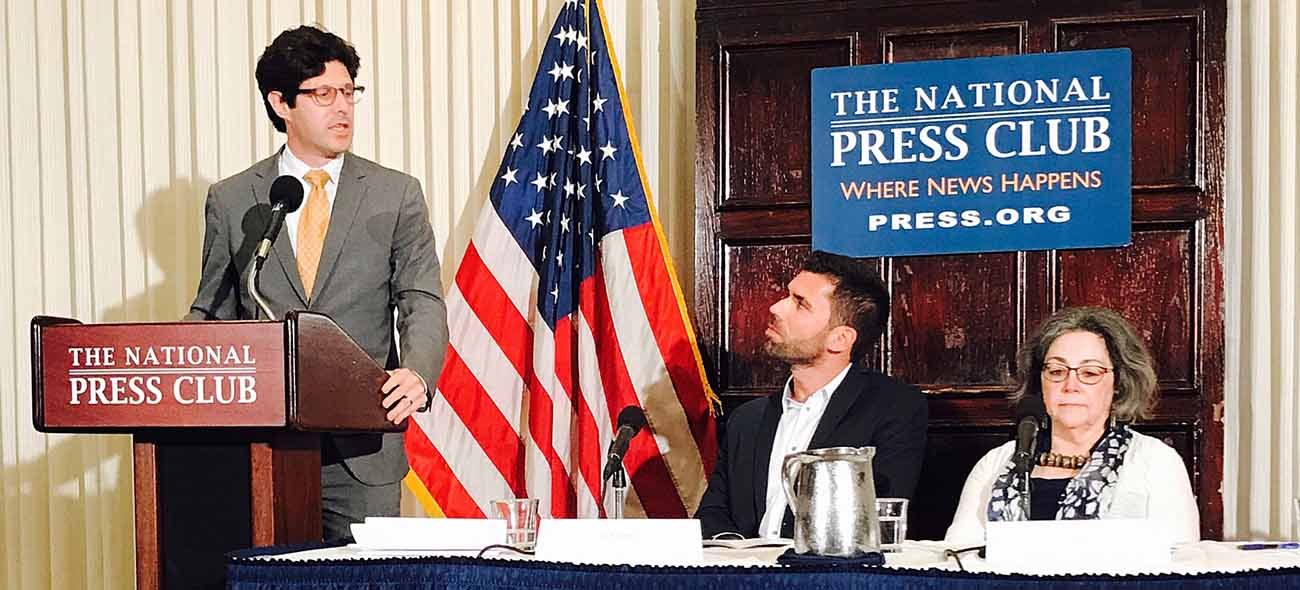WASHINGTON (CNS) — Igor Bobic, now a reporter at HuffPost, told a Washington audience June 19 about his own experience as a refugee and the twists and turns that led to being resettled with his parents in the United States and the part Catholic agencies played in his family’s new life.
“I wouldn’t be here; I wouldn’t be alive, without the help of the USCCB and Catholic Charities,” he said, referring to the U.S. Conference of Catholic Bishops.
Bobic spoke as part of a panel on “Perspectives on Refugee Resettlement in U.S.” during an event sponsored by the USCCB’s Migration and Refugees Services at the National Press Club in advance of World Refugee Day, observed June 20.
[hotblock]
Other speakers included Patricia Maloof, program director of migration and refugee services for Catholic Charities of the Diocese of Arlington, Virginia, and Jeremy Robbins, executive director of the New America Economy, which that day released a report about refugees’ positive economic impact titled “From Struggle to Resilience.”
Bobic was just 7 years old when his family fled the war in Bosnia during the breakup of the former Yugoslavia.
Since his parents were in a “mixed marriage” — his mom was Muslim and his dad was Christian Orthodox — the family was particularly in danger during the war. After his mom was jailed for several days, his family sneaked out of the country in the middle of the night, without any time to gather possessions to take with them. He recalled moving from place to place, sleeping in ice rinks or soccer stadiums.
At one point, he and his mother got separated from his father, but a few weeks later they bumped into him along the journey. Bobic still remembers how the three of them huddled together crying in disbelief of their good fortune.
After a Serbian Christian family took them in, they were able to apply to be resettled through the United Nations. He called the process “stringent and thorough,” and remembered going through many interviews with government officials.
[hotblock2]
When they finally made it to the country, Bobic said his father stayed up all night because he couldn’t believe they had finally made it. When someone knocked on their door the next morning, they were afraid it was someone telling them they had to leave the country. But before long, the family had adjusted, his father got work within three months, and he grew up as a U.S. citizen.
In his remarks, Robbins talked about the findings of the New America Economy report, including how cities that receive the most refugees per capita overwhelmingly experience crime decreases in the years that follow their resettlement, such as Southfield, Michigan, which saw violent crime drop by more than 77 percent.
Robbins also noted that refugees contribute to the revitalization of places such as Buffalo, New York, where refugees have bought hundreds of previously abandoned homes.
In addition, refugees’ incomes triple from an average of $22,000 when they first arrive to an average of $67,000 after they have been in the country for 25 years. The combined incomes of refugees in 2015 was $77.2 billion, with $6.4 billion going to state and local taxes and $14.5 billion going to federal taxes. With the baby boomer generation increasingly retiring and selling their homes, the report notes that refugees, 77 percent of whom are of working age, can help address the resulting demographic challenges.
While he believes this economic data is important, Robbins said, “the reality of what changes hearts and minds is stories,” so the question is, “how do you wed the stories and data together?”
The “Perspectives” panel was one of two during the press club event. Speakers on the earlier panel on “Refugee Protection in Global Context” included Washington Auxiliary Bishop Mario E. Dorsonville and Chiara Cardoletti-Carroll, deputy regional representative of the Office of the U.N. High Commissioner for Refugees.
***
Seegers is on the staff of the Catholic Standard, newspaper of the Archdiocese of Washington.
PREVIOUS: Catholic leaders among those calling for restorative justice
NEXT: Archbishop Broglio asks prayers for those who perished in ship collision



Share this story